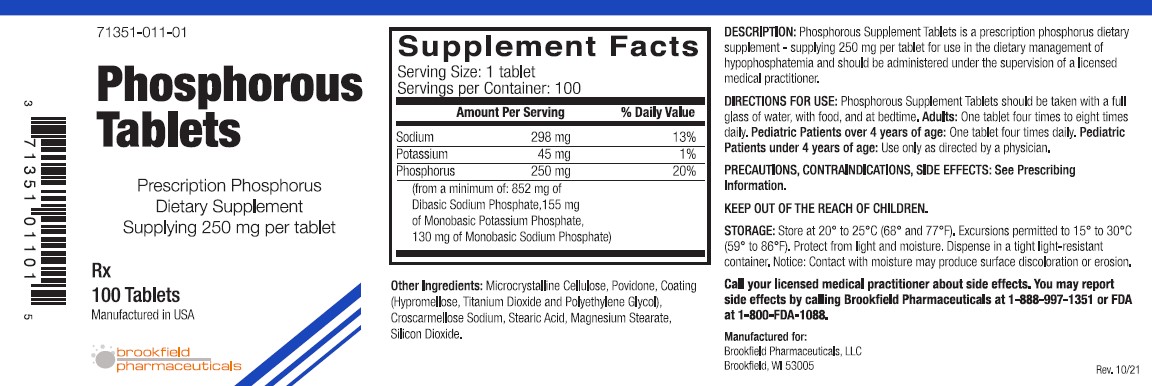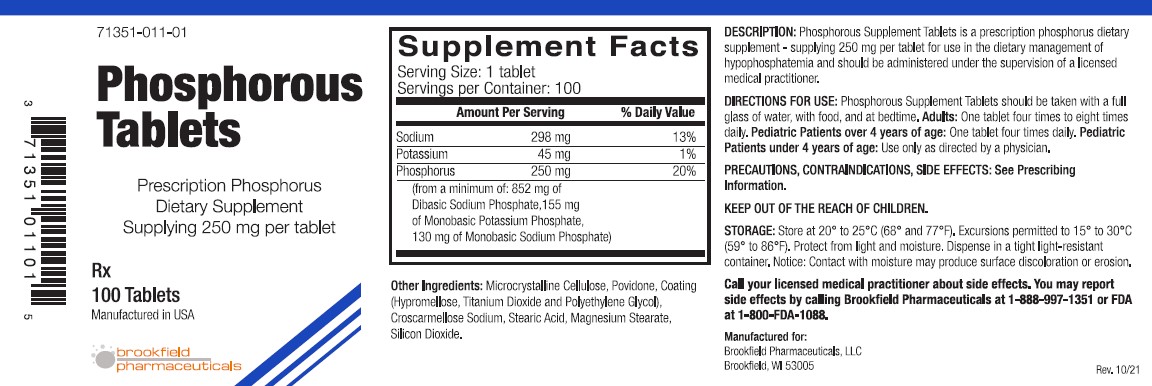Label: PHOSPHOROUS DIETARY SUPPLEMENT- phosphorous tablet
- NHRIC Code(s): 71351-011-01
- Packager: BROOKFIELD PHARMACEUTICALS, LLC
- Category: DIETARY SUPPLEMENT
- DEA Schedule: None
- Marketing Status: Dietary Supplement
Drug Label Information
Updated October 12, 2023
If you are a consumer or patient please visit this version.
- Download DRUG LABEL INFO: PDF XML
- Official Label (Printer Friendly)
-
STATEMENT OF IDENTITY
Phosphorus Dietary Supplement -supplying 250 mg per tablet
71351-011-01DESCRIPTION
Phosphorous Tablets is a prescription phosphorus dietary supplement - supplying 250 mg phosphorus per tablet for use in the dietary management of hypophosphatemia and should be administered under the supervision of a licensed medical practitioner.Supplement Facts Serving Size: 1 tablet Servings per Container: 100 Amount per Serving %Daily Value Sodium 298 mg 13% Potassium 45 mg 1% Phosphorus 250 mg 20% (from a minimum of: 852 mg of Dibasic Sodium Phosphate, 155 mg of Monobasic Potassium Phosphate, 130 mg of Monobasic Sodium Phosphate) Other Ingredients
Microcrystalline Cellulose, Povidone, Coating (Hypromellose, Titanium Dioxide and Polyethylene Glycol), Croscarmellose Sodium, Stearic Acid, Magnesium Stearate, Silicon Dioxide. -
INDICATIONS AND USAGE
As a phosphorus supplement, each tablet supplies 20% of the U.S. Recommended Daily Allowance (U.S. RDA) of phosphorus for adults and
children over 4 years of age. Phosphorous Tablets increases urinary phosphate and pyrophosphate.Contraindications
This product is contradicted in patients with infected phosphate stones in the urinary tract, in patients with severely impaired renal function (less than 30% of normal) and in the presence of hyperphosphatemia. -
PRECAUTIONS
General
This product contains potassium and sodium and should be used with caution if clinical management of these elements is desired. Some individuals may experience a mild laxative effect during the first few days of phosphate supplementation; lower the daily dose until this effect subsides or, if necessary, discontinue the use of the product. Caution should be exercised when prescribing this product in the following conditions: Cardiac disease (particularly in patients receiving digitalis); severe adrenal insufficiency (Addison's disease); acute dehydration; severe renal insufficiency; renal function impairment or chronic renal disease; extensive tissue breakdown (such as with severe burns); myotonia congenita; cardiac failure; cirrhosis of the liver or severe hepatic disease; peripheral or pulmonary edema; hypernatremia; hypertension; toxemia of pregnancy, hypoparathyroidism; and acute pancreatitis. High serum phosphate levels may increase the incidence of extraskeletal calcification.Information for Patients
Patients with kidney stones may pass old stones when phosphate supplementation is started and should be warned of this possibility. Patients should be advised to avoid the use of antacids containing aluminum, magnesium, or calcium because they may prevent the absorption of phosphate.Laboratory Tests
Careful monitoring of renal function and serum calcium, phosphorus, potassium, and sodium may be required at periodic intervals during phosphate supplementation. Other tests may be warranted in some patients, depending on conditions.Drug Interactions The use of antacids containing magnesium, aluminum, or calcium in conjunction with phosphate preparations may bind the phosphate and prevent its absorption. Concurrent use of antihypertensive drugs or corticosteroids with sodium phosphate may result in hypernatremia. Calcium-containing preparations and/or Vitamin D may antagonize the effects of phosphates in the treatment of hypercalcemia. Potassium-containing medication or potassium-sparing diuretics may cause hyperkalemia. Patients should have serum potassium level determinations at periodic intervals.
Carcinogenesis, Mutagenesis, Impairment of Fertility
No long term or reproduction studies in animals or humans have been performed with Phosphorous Tablets to evaluate its carcinogenic, mutagenic, or impairment of fertility potential.Pregnancy and Lactation
Animal reproduction studies have not been conducted with Phosphorous Tablets. It is also not known whether this product can cause fetal harm when administered to a pregnant woman or can affect reproductive capacity. This product should be given to a pregnant woman only if clearly needed.
It is not known whether this product is excreted in human milk. Because many substances are excreted in human milk, caution should be exercised when this product is administered to a nursing woman.Pediatric Use: See DIRECTIONS FOR USE.
SIDE EFFECTS
Gastrointestinal upset (diarrhea, nausea, stomach pain, or vomiting) may occur with phosphate supplementation. Bone and joint pain and possibly osteomalacia could occur.
Adverse effects due to sodium or potassium may be observed: headache; dizziness; mental confusion; seizures; weakness or heaviness of legs; unusual tiredness or weakness; numbness, tingling, pain or weakness of hands or feet; numbness or tingling around lips; fast or irregular heartbeat; shortness of breath or troubled breathing; swelling of feet or lower legs; unusual weight gain; low urine output; unusual thirst.
-
DIRECTIONS FOR USE
Phosphorous Supplement Tablets should be taken with a full glass of water, with food, and at bedtime.
Adults: One tablet four times to eight times daily.
Pediatric patients over 4 years of age: One tablet four times daily.
Pediatric Patients under 4 years of age: Use only as directed by a licensed physician. - STORAGE
- WARNINGS
- PRINCIPAL DISPLAY PANEL
-
INGREDIENTS AND APPEARANCE
PHOSPHOROUS DIETARY SUPPLEMENT
phosphorous tabletProduct Information Product Type DIETARY SUPPLEMENT Item Code (Source) NHRIC:71351-011 Route of Administration ORAL Active Ingredient/Active Moiety Ingredient Name Basis of Strength Strength SODIUM PHOSPHATE, DIBASIC, UNSPECIFIED FORM (UNII: GR686LBA74) (PHOSPHATE ION - UNII:NK08V8K8HR) SODIUM PHOSPHATE, DIBASIC, UNSPECIFIED FORM 852 mg MONOBASIC POTASSIUM PHOSPHATE (UNII: 4J9FJ0HL51) (PHOSPHATE ION - UNII:NK08V8K8HR) MONOBASIC POTASSIUM PHOSPHATE 155 mg SODIUM PHOSPHATE, MONOBASIC, UNSPECIFIED FORM (UNII: 3980JIH2SW) (PHOSPHATE ION - UNII:NK08V8K8HR) SODIUM PHOSPHATE, MONOBASIC, UNSPECIFIED FORM 130 mg Inactive Ingredients Ingredient Name Strength CELLULOSE, MICROCRYSTALLINE (UNII: OP1R32D61U) POVIDONE (UNII: FZ989GH94E) HYPROMELLOSE, UNSPECIFIED (UNII: 3NXW29V3WO) TITANIUM DIOXIDE (UNII: 15FIX9V2JP) POLYETHYLENE GLYCOL, UNSPECIFIED (UNII: 3WJQ0SDW1A) CROSCARMELLOSE SODIUM (UNII: M28OL1HH48) STEARIC ACID (UNII: 4ELV7Z65AP) MAGNESIUM STEARATE (UNII: 70097M6I30) SILICON DIOXIDE (UNII: ETJ7Z6XBU4) Packaging # Item Code Package Description Marketing Start Date Marketing End Date 1 NHRIC:71351-011-01 100 in 1 BOTTLE, PLASTIC Marketing Information Marketing Category Application Number or Monograph Citation Marketing Start Date Marketing End Date DIETARY SUPPLEMENT 10/13/2023 Supplement Facts Serving Size : Serving per Container : Amount Per Serving % Daily Value color shape size (solid drugs) 17 mm scoring 1 Labeler - BROOKFIELD PHARMACEUTICALS, LLC (080592685)


